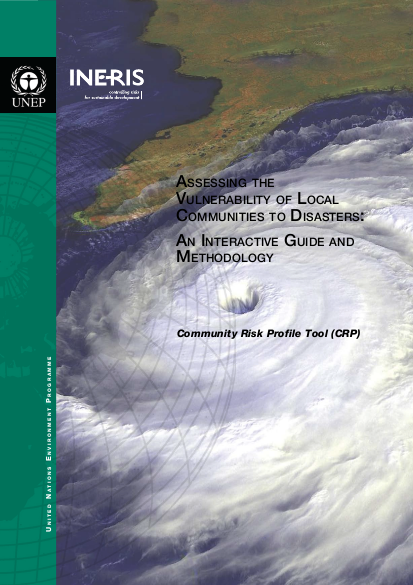
Most communities face risks which they have to assess and manage. Risks may arise from human activities such as industrial accidents, or they may be of natural origin such as floods, earthquakes, etc. Risks need to be taken into account in the decision making process of the overall disaster management policy of such communities. There are, of course, decisions concerning management of risks themselves, but other decisions, such as those relating to land use planning or industrial investment, also require consideration of risk.
Assessing risks is not an easy task. It requires conducting in-depth studies, which will only be justified if the expected level of risk is high. Against this background, UNEP decided to develop this Community Risk Profile (CRP) tool to provide communities with a means of making a rough estimate of various types of risks they are exposed to, supporting the decision making process, especially as to whether or not further assessments are needed. The CRP is not, therefore, a risk assessment tool. It is a tool that will provide users with a qualitative approach to characterise an expected level of risk and thus decide on the necessity for further assessment. It is also a tool that can be used to support awareness raising and capacity building activities. This is a guide where the methodology has not been widely used. Therefore, we strongly recommend that communities using the CRP tool provide UNEP with feedback to facilitate the review and improvement of the tool.
The CRP tool itself is in the form of a set of Excel™ spreadsheets that allow users to characterise the risks facing a given community by responding to a set of questions. Once the spreadsheets are filled out (i.e. the questions are answered) the community’s CRP is produced automatically. This process is described in detail in this manual.
Resource collections
- ALNAP focus topics
- Evaluating humanitarian action
- Locally led humanitarian action
- UN Habitat - Urban Response Collection
- Urban Response - Urban Crisis Preparedness and Risk Reduction
- Urban Response Collection - Community Engagement and Social Cohesion
- Urban Response Collection - Economic Recovery
- Urban Response Collection - Environment and Climate Change
- Urban Response Collection - Housing, Land and Property
- Urban Response Collection - Urban Crisis Response, Recovery and Reconstruction
- Urban Response Collection - Urban Resilience